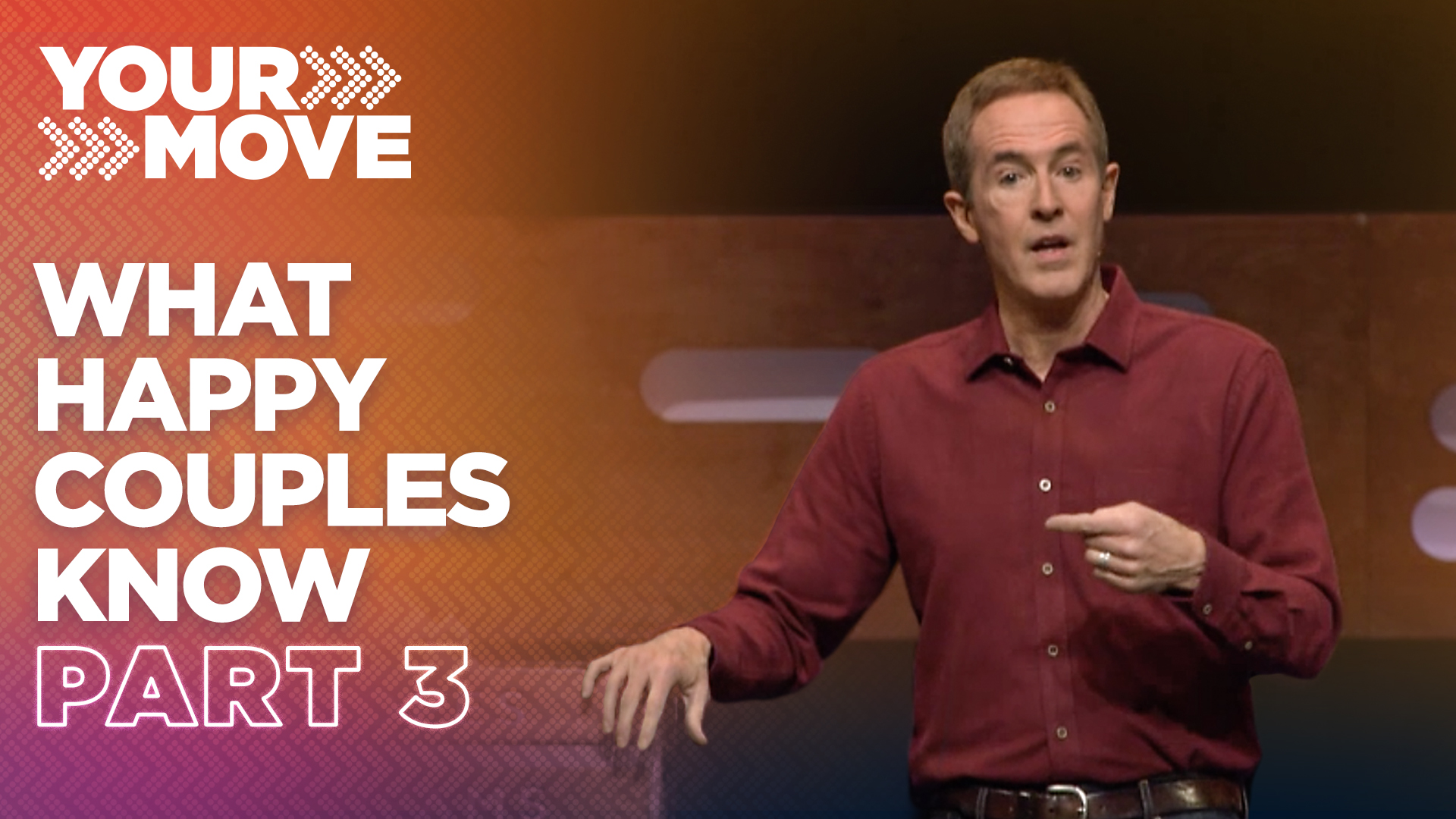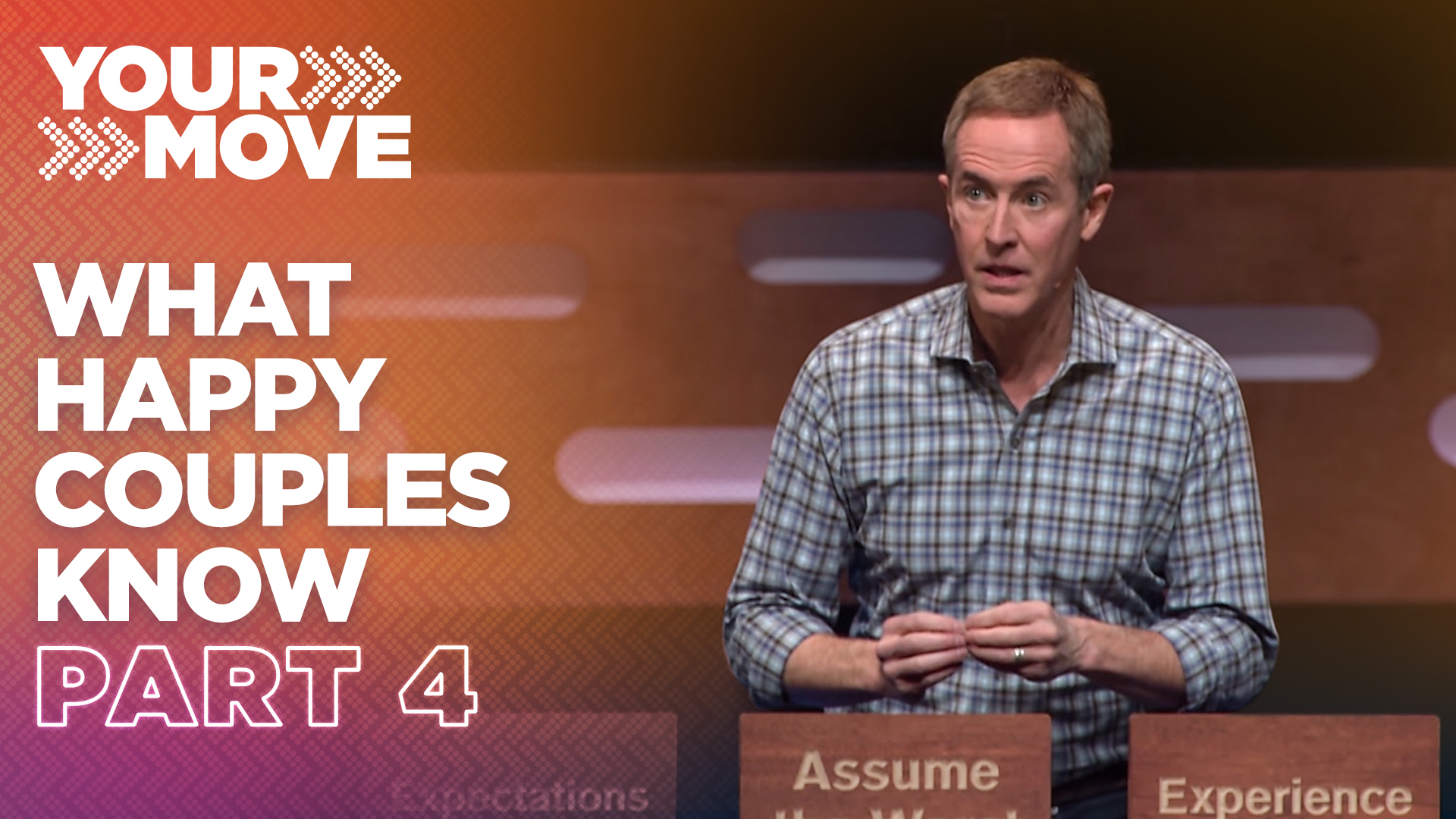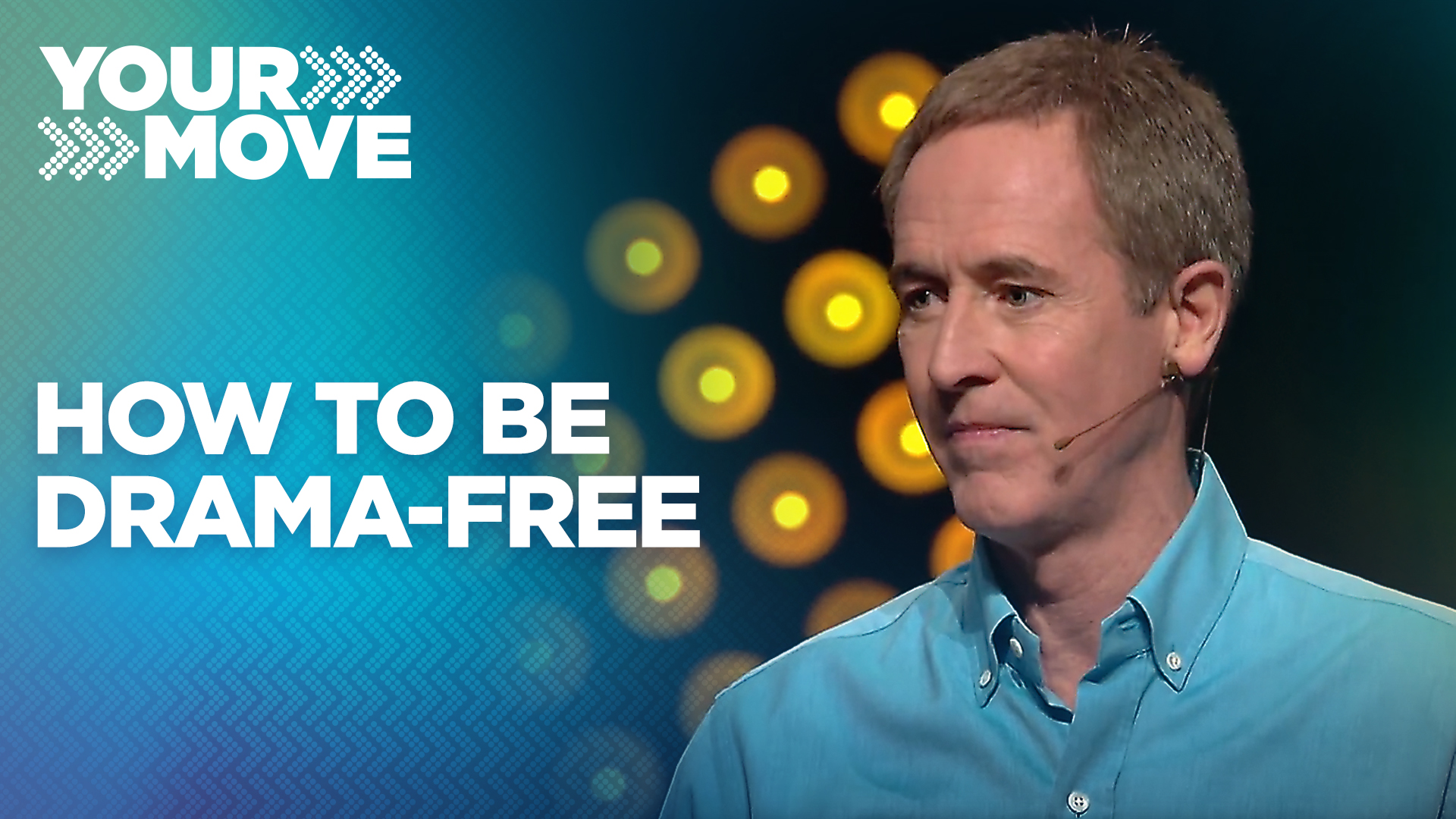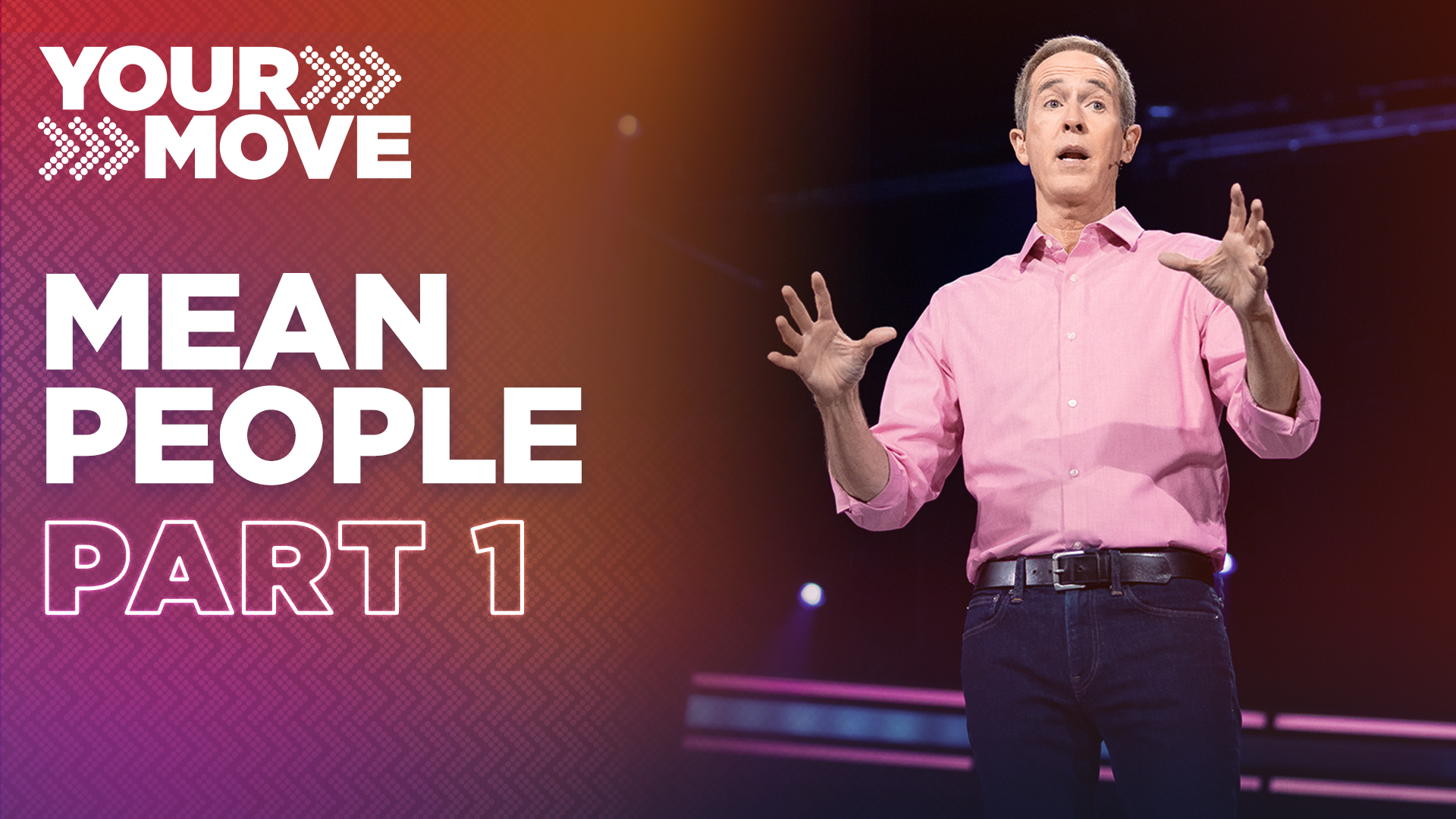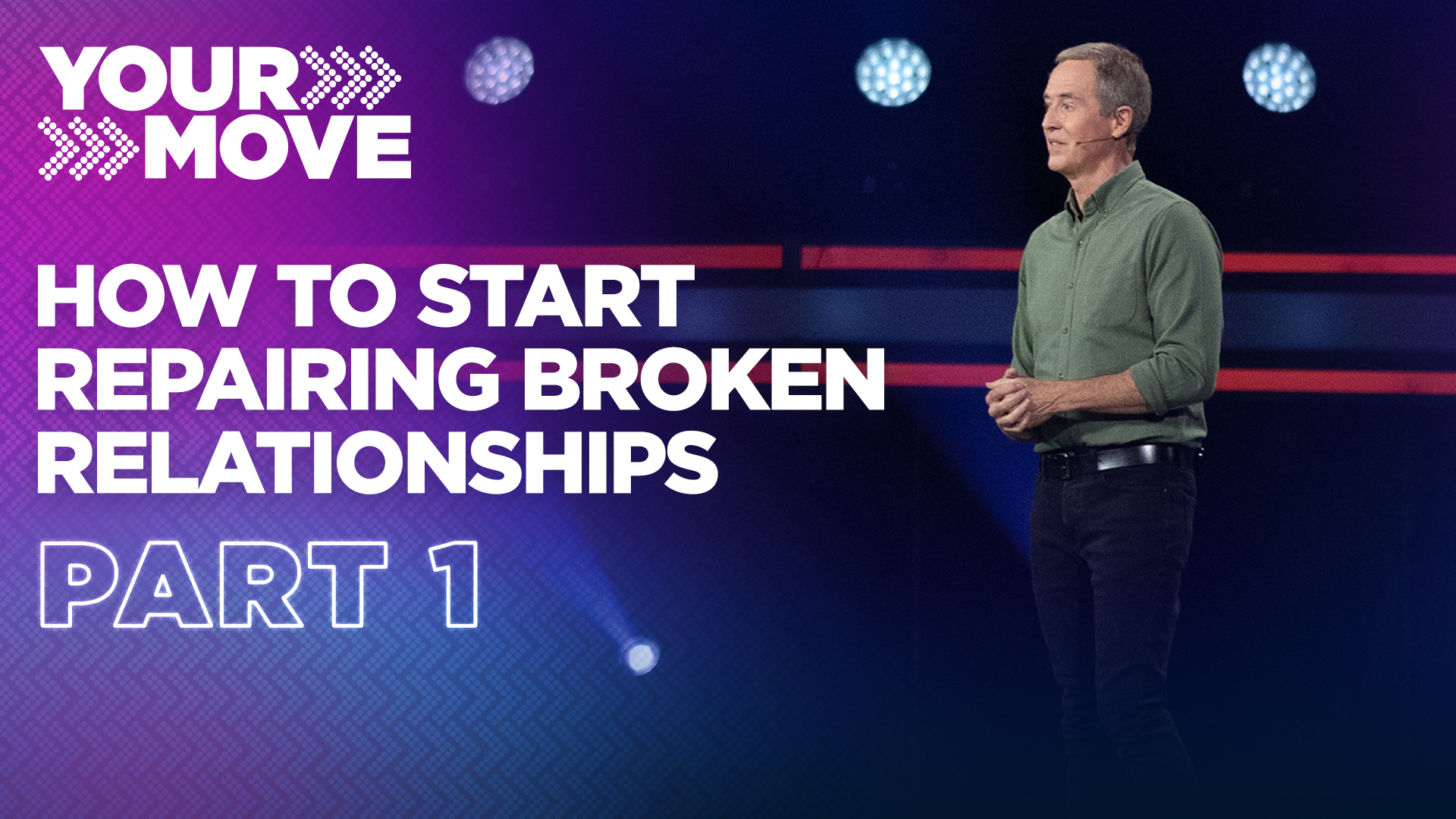In every relationship, both people have hopes, dreams, and desires. But how do you keep them from turning into expectations for each other to fulfill?
- How would you describe the happiest couple you know?
- What do you think creating a great romantic relationship requires of each person?
- Have you ever been in a relationship in which the other person felt you owed them something? If so, what happened to that relationship?
- Andy mentioned that great marriages aren’t built on a division of labor; they are a submission competition. How does that statement challenge your assumptions about marriage?
- How would you treat your partner differently if you were convinced they owed you nothing?
NOTE: The following content is a raw transcript and has not been edited for grammar, punctuation, or word usage.
Hey we’re in part two of this series of What Happy Couples Know, and to recap where we were last time. All of us come into relationships, or dream of relationships, or imagine relationships with things in mind that we wanna be true of those relationships. We moved toward engagement with those things. We move toward the altar with those things. And essentially, we said last week, it’s essentially that we all have a box of hopes and dreams and desires. And even if you’re single and not dating anybody right now, you could sit down and script out in general terms, “Hey! If I’m ever in a relationship, if I’m ever married, here’s what I’d like it to look like.”
Now, the problem is, or the challenge is, it’s not even a problem. It’s just the challenge, the challenge is this. When we daydream about the future, our future as we daydream and as we imagine, it organizes itself around our box. It organizes itself around our hopes, wishes, dreams and desires. To put it another way, when I was single, I never daydreamed about becoming the perfect person for someone, I daydreamed about finding the perfect person for me. Is that just me? I never daydreamed about, I can’t wait until I become the perfect person for someone. I daydreamed about the perfect person for me. So when I met Sandra, I thought, “Oh, she’s perfect for me.” So I brought her ring and my box to the altar. I brought her ring and my box to the wedding. And the thing is, everything in my box seems perfectly reasonable to me. Why wouldn’t everybody not wanna center their lives around what’s in my box? And she brought her box to the altar, into the wedding as well, and everything in her box seemed perfectly reasonable to her.
But the problem is when we, when we hand our box of hopes, dreams and desires to somebody else, the density changes, and the weight changes. And what begins and feels to us like a hope or a dream or desire feels to them like an expectation. And the interesting thing is this, on this side of the box, it’s all hopes, dreams and desires. On that side of the box, it’s all expectations. I’m like, “Why wouldn’t everybody wanted their life this way?” And the person on the other side of the box is going, “Because that just feels like a lot of expectations to me.” From where I’m standing, hopes, dreams, and desires. From where you’re sitting, from where she’s standing, all about the expectations. And expectation as you know, or if you don’t know, here’s the definition. It’s a strong belief that something will happen or be the case in the future. It’s the strong belief that something will happen. “Honey I know we’re not there yet, but we’re moving in that direction. Aren’t we, honey?” “Dear I know this is the first year, but eventually, right honey?” It’s that subtle pressure that things are going to be the way I imagine they’re gonna be. They’re gonna be the way that you imagine they’re gonna be. It’s subtle. It’s all about the future.
And here’s the thing, anytime, anytime we attempt to recreate or avoid something from the past, anytime we attempt in a relationship to recreate or avoid something from the past, our hopes and dreams, and our desires begin to feel like expectations because we want to create a preferred future. It may be a preferred future that’s exactly like the past that we grew up in. We wanna recreate it or it may be a preferred future that’s very different than the family that we grew up in. But either way, as soon as we try to shape the future of a relationship, it begins to feel like expectations to the person that we’re in relationship with. And when couples exchange boxes and we do, this just happens. I don’t know that it can be completely avoided. But when we exchange boxes, couples begin negotiating with each other, bargaining with each other, sometimes bribing each other. “I will, if you will.” “If you’ll do this the way I wanna do it, then we’ll avoid conflict and we’ll resolve conflict the way you do.” And what happens is, without ever, no one ever intends for this to happen.
Eventually, the relationship is characterized as we said last week, by a debt/debtor relationship. “You owe me. You owe me. You owe me.” And the problem is, we said this last week, that when you get into this dynamic, when this dynamic characterizes the relationship, you cannot recognize, you cannot recognize love. You can’t give love and you can’t receive love because you can’t appreciate it and you can’t even recognize it.
Now, let me illustrate it this way. You see, if you owe me money, you can’t give me money, right? If you owe me money, you give me money. If you owe me money and you give me money, I don’t see it as a gift, and I don’t receive it as a gift. I see it and receive it as a payment.3. So in a relationship that has become a debt-debtor or the dynamic of the relationship is a debt-debtor relationship. As long as somebody feels like somebody owes them, they don’t receive it as love, they can’t see it as love, and the other person can’t even extend love.
So the question is, “How do we keep this from happening? How do we keep legitimate hopes, dreams, and desires from becoming and feeling like expectations?” And the answer is, “We answer the following question the way that happy couples answer the following question.” And the question is, “What does he owe me? What does she owe me? What does he owe me? What does she owe me?” And happy couples all answer this question the same way. They answer the question, “Nothing, they don’t owe me anything.” They know that they owe each other everything, but are owed nothing in return. They know that they owe each other everything, but are owed nothing in return, which granted, doesn’t make any sense. But as you get to know really, really happy couples, there’s something about their relationship that doesn’t make any sense.
Great relationships are not built on specific codes of conduct, and they’re not even built on specific roles. And they’re not built… A great relationship is not built on a sort of an exchange of services, of goods and services. That great relationships, as I said last week, really boils down to being a submission competition, where both people are racing to the back or to the end of the line. That in a great relationship, in any healthy relationship, instead of there being competition, instead of there being trying bargaining and negotiating, there’s a sense of, well, she doesn’t owe me, he doesn’t owe me anything, but I feel like I owe her, I owe him everything.
Now today, I wanna explain where I learned this, and where I saw this, and where we get this, and here’s the story. Here’s how it happened. At the end of Jesus’ ministry, the end of Jesus’ ministry, he’s hours away from being arrested. He gathers his guys together, and he says to them, “Here’s a few things I want you to remember.” And toward the end of that time, as they’re sharing their last Passover together, he says this. He said, “I’m going to give you a brand new command.” Now, this should have been very offensive. In fact, these Jewish boys should have gotten up and left the room, and here’s why. This doesn’t bother us, doesn’t phase us in the least, but the only person that could give a command was God, and God had given all the commands through Moses. So you can talk about the commands, you can exegete the commands, you can explain the commands, you can apply the commands, you can prioritize the commands, but you don’t make up new ones.
So, there was a sense in which Jesus was equating himself with Moses and in a sense, claiming to speak for God. And these guys should have gotten up and left the room, but the night had already been very confusing. Judas had left to run an errand. Jesus basically took their most sacred holiday and turned it into something all about himself, so the whole night is crazy, and he says, “Guys, I know this is crazy. I’m kinda stepping in front of Moses. I’m stepping between you and God, but I’m gonna give you a new command.” And here’s what he said. He said, “A new command I give you: love one another.” To which they may have responded, “That’s not new.” To which Jesus would have responded, “I’m not through, because here’s the rest of it, [laughter] a new command I give you, love one another as I have loved you, so you must love one another.” Now this is an epic moment. This is such a big moment, because Jesus says, “I’m reducing all the Jewish law from 600 and something to two, to one. That at the end of the day, these are your marching orders relationally. You are to treat other people the way I have treated you.”
And he could have gone around the room to each one of those guys and said, “Matthew, remember when we met? You were a tax collector, you were an embarrassment to your family, you were an embarrassment to the nation. And do you remember what I said to you when I met you, Matthew?” Matthew’s like, “Yep, I remember. You asked me to follow you.” “And Peter, you remember how you didn’t want Matthew following us cause you didn’t wanna be associated with a tax gatherer?” And Peter’s like, “Yep.” “And remember I let both of you stay in the club? And Matthew, do you remember where we went when I invited you to follow me?” “Yep, we went to my house.” “Do you remember who we invited?” Peter’s like, “I remember who we invited, all of his tax gathering friends. It was the worst day of my life.” [laughter] And Jesus said, “Matthew, I want you to extend that kind of grace and that kind of mercy to every single person you meet for the rest of your life.”
He could have gone all the way around the room and said, “Okay, from now on, I want you to think about how I treated you. That’s how I want you to treat everybody.” And a few hours later, he would be arrested, and he would be tried, and he would be crucified. And that would be, in a few days, an “ah-hah” moment from which they would never recover when they realized, Jesus gave his life on our behalf, and he is asking us to do the same for other people. That’s why, this is sometimes called the Law of Christ, or I call it the Platinum Rule. The Golden Rule is treat people the way you wanna be treated. The Platinum Rule is treat people the way that God and Christ treated you.
In fact, let me kind of make it simple to remember. When you’re not sure what to say or do, you just love like God, through Christ, loved you. That’s it. When you’re not sure what to say or do relationally, you go “Okay, how did God through Christ treat me when I was misbehaving, when I messed up, when I broke a promise?” When you’re not sure what to say or do, you love like God through Christ loved you. This is the big one, this is the marching orders. Every single New Testament imperative after the resurrection, every single New Testament imperative after the resurrection, tees off and keys off of this big idea, “As I’ve loved you, so you’re to love other people.”
Then a few years later a guy named Paul, the Apostle Paul, who hated Christians, arrested Christians, tortured Christians, put Christians to death. If you hate Christians you would love the Apostle Paul, he hated them more than you, you hate them in your mind, he hated them as a job. Okay? And the Apostle Paul becomes a Jesus follower and when he does, his life is completely transformed and he takes this big idea of “Love others the way that God, through Christ, has loved us.” He takes that big idea and he begins to apply it to all kinds of relationships. He applies it to everything including marriage.
So whenever you read anything the Apostle Paul writes in his letters that says do this or don’t do that, do this or don’t do that, here’s what you need to remember, every one of his commands, every one of his commands is linked specifically and directly to Jesus’ command “To treat others the way that I have treated you.” He’s not making stuff up, he’s applying Jesus’ brand new command. So, in his letter to the Christians living in Ephesus, the Apostle Paul applies Jesus’ new command to marriage. And here’s what he says, “Wives, submit yourself to your own husbands as you do to the Lord.” What could be any clearer than that? Let’s pray.
[laughter]
Now, if this bothers you, I’m so glad it bothers you and I’m so glad you’re here. I’m just gonna leave it up here to bother you. 3That whole idea is why I don’t like Christians.” I’m telling you, what you’re about to hear, this is so transformational, I love talking about this. Our English Bibles are translations from Greek text and there were groupings of Greek text all over the East. And the oldest text, the oldest manuscripts of the New Testament, the oldest manuscripts of the Apostle Paul’s letters, interestingly enough, if you took this verse and you translate it literally here’s what it would say. It would say “Wives, to your own husbands as to the Lord.” There’s no verb in this statement, in the oldest Greek manuscripts. There’s no verb. The word “submit” isn’t there.
Now, before I explain why it’s not there, I wanna explain something else, and this is so important. When the Apostle Paul’s first century audience heard him teach about women submitting to their husbands, and I’ll tell you where the verb came from in just a second, when the first century audience heard the Apostle Paul talk about women and wives submitting to their husbands, where as we go “What?” and “Huh?” Their response was “Duh!” not “Huh?” They weren’t like “What?” They were like “Well yeah, tell us something we don’t know.” They had no choice. This wasn’t new information. This wasn’t even a big deal, this was common ground.
So, why no verb in the oldest Greek text? Why isn’t there a verb in this verse? And the answer is, the verb comes from the verse before. And this was a typical kind of Greek grammatical way of doing things, that you make a statement with the verb and then in the next statement you just infer the verb. You don’t include it, you just take your verb from what came before. That submit, the verb submit, is actually inferred from the verse that came before. So, we should ask “What was the verse that came before that gives us the verb for this verse?” And my friends, you’re looking up here, this is a game changer. Here’s what Paul said before he told “Wives submit to their husbands.” Here’s the verse that sets the tone for everything that follows, here’s our verb “Submit to one another out of,” and there it is again, every time the Apostle Paul tells us to do something he points us back to Jesus.
“As God through Christ has done something extraordinary for you, you are to demonstrate that same kind of love in your relationships with each other, including romantic relationships, including marriage. You are to submit to one another out of reverence to Christ.” In other words, the submission, guys get ready, is mutual.
It is mutual submission. My friends if you don’t hear anything else today, this makes marriage amazing, this makes relationships amazing. This is what happy couples know, they know, I’m here for you, you’re here for me but I’m not here for you because you’re here for me, I’m just here for you because God was here for me when I needed my Heavenly Father. I’m gonna leverage all of my resources, all of my talents, all of my gifts, all… I’m gonna leverage all of me for what benefits you the most.
I’m telling you in the first century, this was unbelievable. And Jesus is the model. So what Paul did is so brilliant.
So he begins, “Submit yourself to one another out of reverence for Christ.” So, Paul begins where the common ground is and he goes from there. But then, but then, he applies it to men. Here’s what he says; we’ll go to “wives submit”. “Wives, submit yourselves to your own husbands as you do unto the Lord.” His point is ladies, I want you to place your husband or your man’s if you’re in moving toward a permanent relationship, I want you to place your man’s hopes, dreams and desires ahead of your own. I want you to deal out of his box not because he expects, not because he expects it, but because your Heavenly Father requests it.
But, what came next, what came next was shocking. What came next had an effect on the audience that mimics or parallels our 21st century response to wives submit to your husbands. Because in that culture again, it was assumed but what came next, I’m telling you, it was so disruptive, it was so unbelievable, it was so new, it was so different. What comes next? So this is what he says to the men, “Husbands, love your wives…” Now, we’re like, “Well, of course…” But in the first century it wasn’t of course, in the first century is, “Wait, wait, wait. I don’t have an obligation to my woman. My woman has an obligation to me”. The apostle Paul says, I’m not finished, “Husbands, love your wives just as… ” And this is the key, this is the connection, this is the link, these are the two words you should look for throughout the New Testament when you read the New Testament after the resurrection.
“Husbands love your wives just as Christ.” There it is, “Just as Christ loved the church and gave himself up for her…” Now, this is a Christian audience in Ephesus and the guys are like, “Wait, wait, wait, wait, wait. [chuckle] I know this story. This does not end well for Christ. [laughter] This does not end well for Jesus. Okay, I know where you’re going with this, and Paul okay, we get that wives submit, because they kinda have to but now, you’re telling us that we have a responsibility toward women? We have a responsibility toward our wives? That somehow, you’re inferring that there might even be a sense of equality? Where are you going with this?” And the thing is, we know where this goes, Jesus died for the church. Paul’s still not done. He says, look at this, he says, “In the same way, husbands oughta love their wives as their own body.” Just like he’s saying, “Okay, if you can’t get the theology thing about Jesus and the church, let me make it real simple for you guys, you are to love your wife, you are responsible to care for your wife. You are responsible to protect your wife as if she is you”. This was just more than they could imagine.
And he says this, “He who loves his wife loves himself.” Well, Paul, what are you talking about? Paul says, “Because there’s a mystery. There’s a mystery that when two people are married, they become one flesh.” So there’s no division, there’s no pulling away, they’re one flesh. Men, your wives are one with you, I’m telling you as many times as you’ve heard this and as strange as it may be, and as Biblical as it may be, this was brand new because he was equating men with women, this was scandalous. It’s why I said, it’s why I said this, “What comes next is why what came first is so offensive to us”.
The reason that we bristle, and that women you bristle is because our culture, our American culture, our western culture embraces the equality of men and women. We embrace the equality of men and women, so the minute we hear somebody’s supposed to submit to somebody else, that’s like “Ergh,” but ladies here’s the amazing news. Guess who introduced this idea of equality to the world? Guess who rolled this out in such a big way that it actually made a big difference in culture? Guess who was the first person with any authority that declared you equal with men? Jesus. I’m telling you, I know this is naïve, I think every woman should be a Jesus follower if for no other reason but this. He argued for your value, he argued for your worth, he argued for your dignity before it was a category for anybody else in the world. And the Apostle Paul comes along and says “Men, because of the way your Heavenly Father views the women in your life, you are to treat them with extraordinary, extraordinary value.”
And so Jesus rolls this out, the Apostle Paul pumps it up and he says “I know you weren’t surprised when I said women are to submit to their husbands, but I’m telling you men, women, in God’s eyes you are equally value and you are to submit to one another.” This was life changing. But don’t be deceived. Our society that values men and women, that’s not natural. There’re other places in the world where women are still treated the way they were in the first century, you now that. It’s not natural. This is a shadow, it’s a shade, it’s a left over of the teaching of Jesus and the teaching of Paul as it relates to women.
So back to Paul, what’s his point? His point is, men let me ask you a question. What is life to you? So he’s talking, we’re back to the men, “Men, what is life to you?” “Okay, I don’t know.” Just think. What is… “I don’t have a lot.” Yeah, you do. Okay men, what is life to you? Here’s his point. Just put her before that. Whatever life is to you, put her before that. And you can’t do that, you can’t do that as long as you’ve got a big box of expectations between you and her. And ladies, he would say, “You can’t love your husband as you’re trying to mutually submit to each other as long as you’ve got a big box of expectation sitting between you.” And this is what great, happy couples know, that somehow they get rid of this and they become all for the other person.
So here’s the question, how do you get everything out of the expectation box back into the hopes, dreams? That’s desires and dreams box, and then what do you do with it once you get it here? And the answer to the first question, in terms of how you get everything from here back to here, is you decide, as we said last week, that he doesn’t owe me anything, she doesn’t owe me anything\ And for this to work, and here’s the key, this is what’s gonna frustrate so many of you, I understand, it has to be mutual. Why? Because he said, this is so powerful, “Submit to one another out of reverence for Christ. Submit to one another out of reverence for Christ.” This is what oneness in a relationship looks like, his best over yours, her best over yours.
Now, last week I gave you a little homework assignment but it was a thought process. I asked you two questions, I said this week I want you to think about what’s in your box and then I want you to think about, is somebody carrying it around?
Your homework assignment this week is this, and this is a little more dangerous, okay? I want you to ask them, “What’s in your box? What’s in your box?” Not on the way home, you gotta wait for the right time. I just want you to ask her or ask him. I just want you to say “What’s in your box?” The next thing I want you to do and this is gonna be really difficult for some of you, after you ask “What’s in your box?” then I want you to stop talking.
[laughter]
And listen. Now guys, if you ask your woman, your wife, your fiancé, “What’s in your box?” She may faint that you’ve even or consider, she may get mad. “We’ve been married 20 years and you still don’t know.” Okay, that you just don’t talk. You just take it and take it because yeah, you’ve been married 20 years and you don’t know what’s in her box because you’ve wondering why she doesn’t deal out of your box. Okay, there maybe some distance. So you just ask and you listen. And ladies, if you ask your man, your husband, your fiancé “What’s in your box?” I’ll tell you what he’s gonna say. Probably he’s gonna say “Nothing.”
[laughter]
“Nothing.” Aren’t the Falcons on? [laughter] We don’t even know we have a box. We’re not lying. We don’t know. We don’t know what’s in there.
[laughter]
Now we expect you to fulfill these wishes and dreams and desires that we’ve never defined. And ladies, here’s the other thing about many of us men. We’re scared to talk about it.
And men the reason you need to talk about it is you’re scared to talk about it but you’re expecting her to fulfill it and you’ve never told her. And it’s scary. In fact, it’s terrorizing in some ways, but you talk about it. This is, the what’s in your box question, this is the I’m all in question. This is the I am more interested in what’s in your box and what’s in mine. This is the I’m all in. I’m all into this relationship so much I wanna know what your hopes and your dreams and your desires. This is the I’m all in. This is the less self question. And you know something about less-self people, less-self people are happier people. Find the happiest people you know, less-self. And less-self relationships are the richest and the richer relationships. Now, I know if you’re paying attention to this, in your mind you’re going “Yeah, but what about, what about and you’re arguing.” I get that, I would do the same thing. So, I know for some of you there’s like “Wait, wait, wait. I have one really, really big objection if I’m gonna move forward with this. Okay?” “Okay Andy, if I take the pressure off, you’d have no idea what he’s gonna do. If I take the pressure off, you have no idea how much money she’s gonna spend.”
“If I take the pressure off, he’ll never come home from work. He’ll just live there. Okay. If I take the pressure off, he’ll never follow through, she’ll never follow through. If I take the pressure off, if I take the pressure off, I’m your what? I’m your what? I’m afraid. I’m afraid she won’t, I’m afraid he will, I’m afraid he’ll start, I’m afraid she’ll stop.” But my friends, this is the way forward, this is the way forward. And if your relationship has boiled down to something simply being a tug of war, I mean if your relationship is all about arguing over the box and you’re on one side and he’s on the other or she’s on the other, if your whole relationship has come down to basically “If I pull too hard, he won’t pull hard. If I don’t pull, it goes back and forth.” If your whole relationship comes down to this and the thought of laying down your side of the rope is terrifying, I understand that. I know how this works, okay? It’s like “Okay, honey you heard what he said about the rope. So okay, I’m gonna count to three, we’re gonna drop at the same time. Right? ‘Cause if I’m afraid, if I let pressure off first this is just going in your direction, we’re gonna be living your box and we’ll just be all about… So when I count to three.”
No. Listen, there’s no hope, ‘til you let go of the rope. There’s not. And because you’re a Christian, if you’re Christian, you have to go first. And I’ll tell you why, because when you were dead and your trespasses and your sin, God through Christ dropped his end of the rope. Look, He did something for you. Whether or not you ever did anything in response to what He did for you. That is the gospel. This is why all New Testament post resurrection imperatives and commands in the New Testament all tie back into as God through Christ did for you. So, submit to one another out of reverence for Christ. At the cross God went first. Jesus’ followers go first. Happy couples, happy couples put each other first by going first in an effort to be last. That Jesus’ followers, they put each other first by dropping that rope first in an effort to be last.

